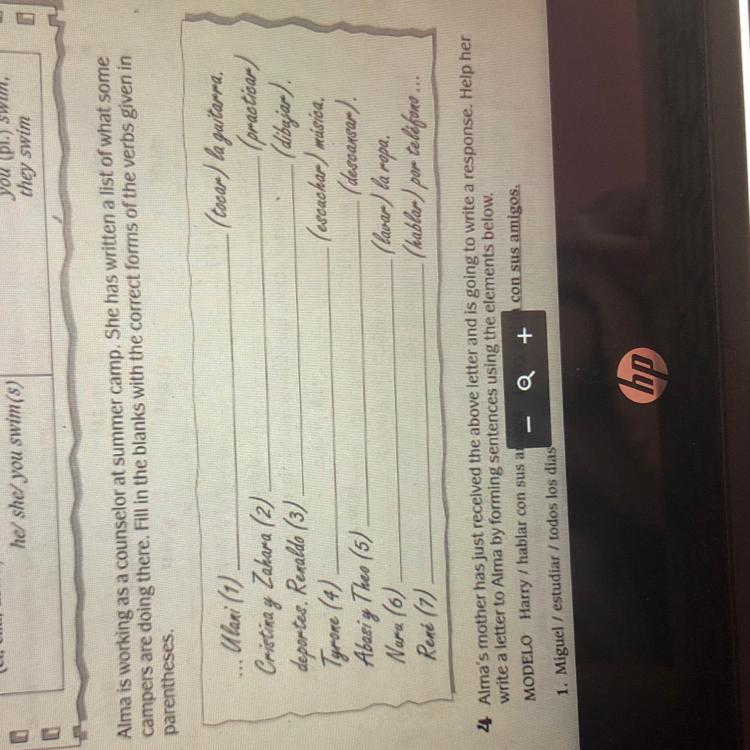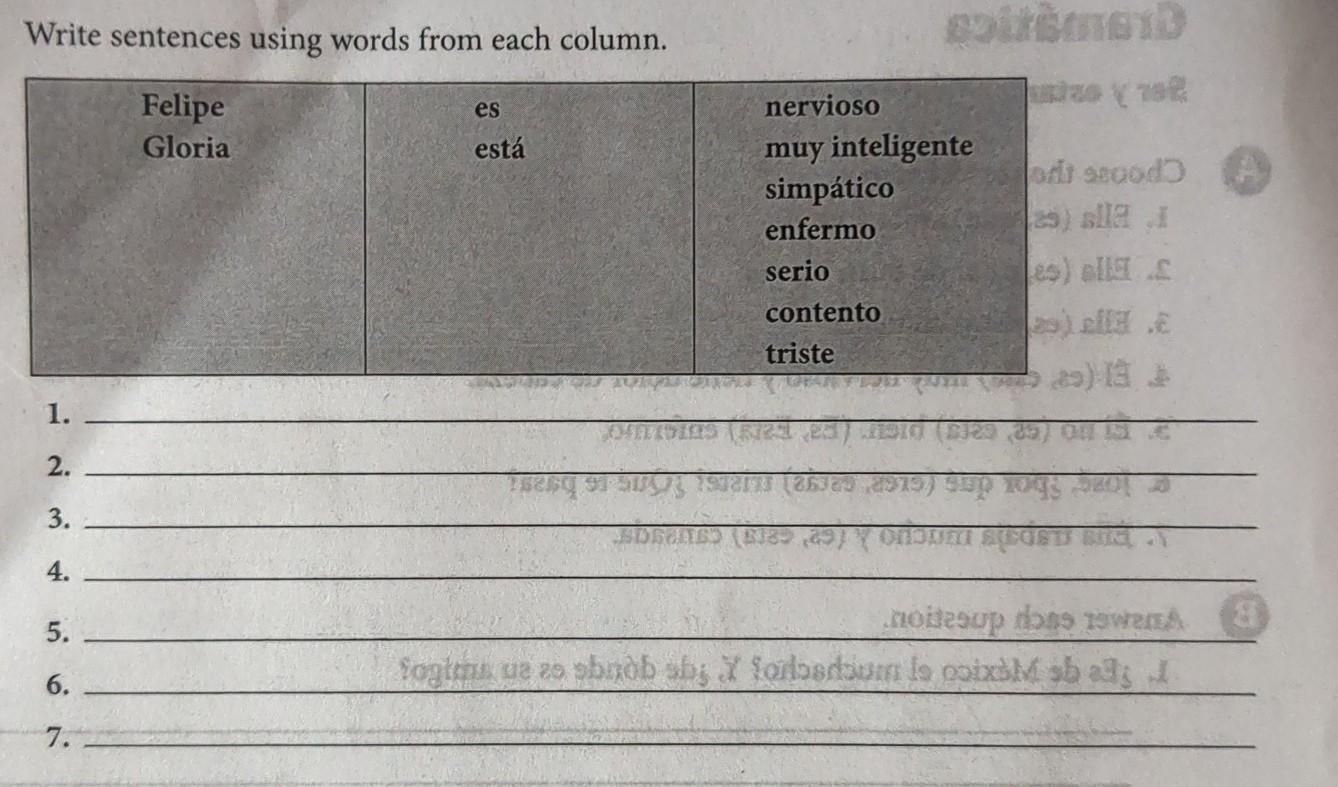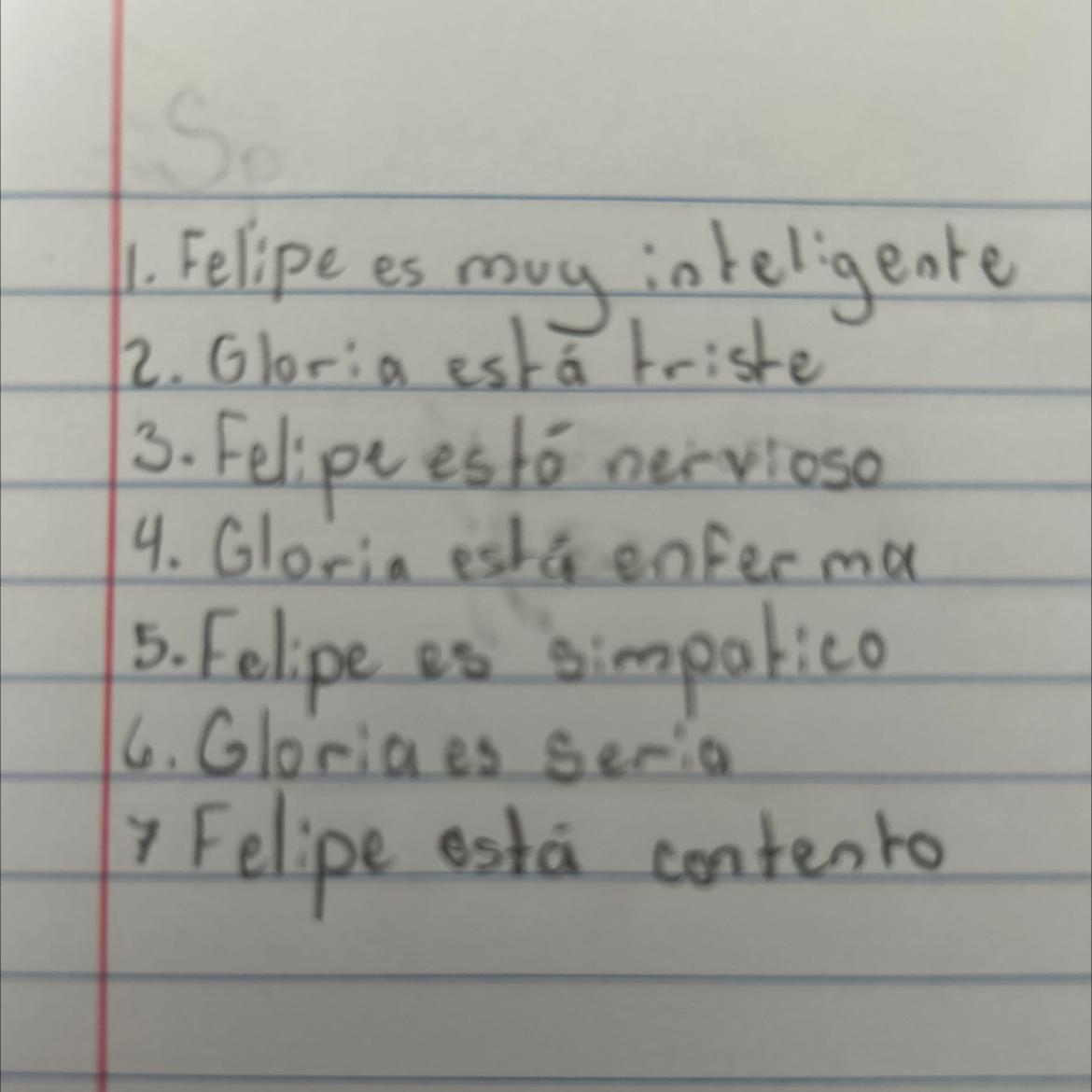Answers
Answer:
It rises, as the Boro or Telgona, in Dar Fertit, and receives from the south and south-west the Raga, Sopo, Chel and Bongo.
Answer:
Te voy a dar un abrazo.
El vecino te va a dar un regalo de cumpleaños
Explanation:
Related Questions
Complete the conversation using the terms in the word bank. Be sure they are conjugated correctly. The encircled letters will spell out the code from top to bottom when placed correctly.

Answers
Answer:
Dihydrostreptomycin
Explanation:
It's an ingredient in the medication "penicillin"
HELP MEEEE!!! 100 POINTSSSSS! MOST CORRECT WILL BE MARKED AS BRAINLIEST!


Answers
Answer:
1. Es
2. Son
3. la
4. las
1. B
2. A
1. B
2. A
3. C
4. F
5. E
6. D
1. C
2. B
3. A
4. D
1. doce
2. siete
3. cuatro
I can't help you with the last one because I'm not experienced with sport seasons. But I hope I was able to help you with the rest of them!
1. Son
2.Son
3.La
4. Las
B.
1. b
2. a
C.
1. b
2.a
3. c
4. f
5. e
6. d
How can we manage balanced diet from the locally available food items
Answers
Answer:
Might be hard at first but U can Balance it By your'e own will :)
Lee las
frases y decide si son ciertas o falsas.
Si una frase es falsa, escríbela con la
información correcta.
1. Es la una de la tarde cuando Lola entra en
6. Lola compra (buys) una revista en la
su piso.
mañana.
2. Ella está sola en su piso.
3. Lola ve a dos hombres hablando
7. Doña Lupe entra en el piso de Lola
con el periódico.
en la calle.
4. Las dos personas están muy contentas.
5. Lola encuentra un llavero con las iniciales
"J.R.D.".
Read the sentences and decide if they are true or false.
If a sentence is false, write it with the
correct information.
1. It's one o'clock in the afternoon when Lola enters
6. Lola buys (...) a magazine in the
his flat.
morning.
2. She is alone in her flat.
3. Lola sees two men talking
7. Doña Lupe enters Lola's apartment
with the newspaper.
on the street.
4. The two people are very happy.
5. Lola finds a keychain with the initials
"J.R.D.".
Answers
fill in the blanks with the correct form of the verb in present tense ella (ver) una pelicula
Answers
Answer:
↔ ve.
Explanation:
⇔ Ella ve una película.
...
7. Luisa se (puso / puse) un suéter muy bonito.
Answers
He admits the guests in the room.
Answers
Answer:
Yes
Explanation:
Answer:
who does?
Explanation:
who is he and these guests do i know them?
Complete the sentence with the appropriate direct object pronoun.
Preparamos una pasta muy rica.
¿___ puedo probar (try)?
Question 6 options:
La
Me
Lo
Nos
Answers
Answer:
> La.
Explanation:
¿La puedo probar?
...
does any body know how to do this?

Answers
Cuando patty era pequeña, siempre iba al parque con su mamá. a ella le gustaba tocar y oler las flores allí. cuando corría, siempre se caía y se lastimaba sus rodillas. eso dolía mucho y siempre terminaba llorando. patty era una niña muy hermosa con largas pestañas y ojos de color café. ¿qué pasaba cuando patty corría? ella estaba muy contenta ella llevaba a su perro ella siempre se caía. ella llevaba una pelota.
Answers
Answer:
ella siempre se caía........
Answer: Ella siempre se caía.
Explanation:
Write here the required verbs and words used to complete the conversation:


Answers
Verbs de pasado: hace tres dias
present: veimos, tenemos, primer voy, no son, Te voy
no sé cuáles son las palabras de vocabulario, así que no puedo responder que lo siento
Based on the ending letters of each noun, determine if nouns are feminine by writing the definite article 'la' and 'el' if the noun is masculine.
determine if nouns are feminine plural by writing the definite article 'las' and 'los' if the noun is masculine plural.
Do not use CAPS or punctuation or your answer won't be properly grade. ___ propiedad
Answers
Answer:
Explanation:
generally, nouns are determined as feminine or masculine depending on their ending letter. any noun that ends in an "a" is feminine, and nouns that end with letters such as "o", "e" etc are masculine. we use the article "la" for singular feminine nouns and "el" for singular masculine nouns.
e.g. "el vestido" or "la sandía"
the noun is plural when it ends in a "s". This means that nouns that end in "as" are feminine plural, and nouns that end in "os" or "es" would be masculine plural.
e.g. "las chicas" or "los chicos"
these are the general rules, though there are some exceptions to these rules, like "el agua"
(i made sure to edit out all the caps)
Hope this helps!
las enfermedades ocasionadas por el sedentarismo
Answers
Sedentary lifestyles increase all causes of mortality, double the risk of cardiovascular diseases, diabetes, and obesity, and increase the risks of colon cancer, high blood pressure, osteoporosis, lipid disorders, depression and anxiety.
Fill in the blinks wort the correct form of the possessive adjective . Please remember that all adjective must agree wort the noun they modify .
Es el cumpleaños de (my)_ Madre hoy. Tiene cuarenta y cinco años. Mi or mis
¿Cómo as llaman (your-singular/informal)_ Hermanos? ¿Cuántos años tienen? Tú or tus
(His)_ primos soy mayores Qué él. Su or sus
(Our)_ familia es muy grande. Nuestro, nuestra, nuestros or nuestras?
(Her)_ hermanos son muy sompáticos y graciosos. Su or sus
(Their)_ perro es muy perezoso. No le gusta jugar. Sólo le gusta comer. Su or sus
(Our)_ tías tienen trienta y ocho y cuarenta y dos años. Nuestro, nuestra, Nuestros, or nuestras?
¿Dónde está (her)_ hermano? Su or sus
(My)_ amigos son muy generosos. Mi or mis
¿Cómo es (your-singular/informal)_ familia? ¿Tienes Hermanos o eres hija única? Tú or tus ?
Answers
The sentences are filled in correctly using the right possessive adjectives.
Es el cumpleaños de mi madre hoy. Tiene cuarenta y cinco años.¿Cómo se llaman tus hermanos? ¿Cuántos años tienen?Sus primos son mayores que él.Nuestra familia es muy grande.Sus hermanos son muy simpáticos y graciosos.Su perro es muy perezoso. No le gusta jugar. Sólo le gusta comer.Nuestras tías tienen treinta y ocho y cuarenta y dos años.¿Dónde está su hermano?Mis amigos son muy generosos.¿Cómo es tu familia? ¿Tienes hermanos o eres hija única?What is a possessive adjective and why is it important?A possessive adjective is a type of adjective that is used to show ownership or possession of a noun. It is important because it clarifies who owns or possesses the noun and adds more detail to a sentence.
The possessive adjectives used above are:
myyour (singular/informal)hisourhertheirmyyour (singular/informal)your (singular/informal)Learn more about possessive adjectives;
https://brainly.com/question/12224225
#SPJ1
Pronunciation of vowels in English and Spanish is_______(similar / different).
Answers
Answer:
Different
Explanation:
Spanish only has 5 vowels
English has more than 14
Spanish (si)
English (yes)
Alma is working as a counselor at summer camp. She has written a list of what some
campers are doing there. Fill in the blanks with the correct forms of the verbs given in
parentheses.
..Mlani (1)
Cristina y Zahara (2)
deportes. Renaldo (3)
Tyrone (4)
Abasig Theo (5)
Nura (6)
(tocar) la guitarra.
(practican)
(dibajar)
(escuchar) musica,
(descansar)
(lavar) la ropa.
(hablar) por teléfono...
René (7)

Answers
Answer:
toca
practican
dibujan
escucha
descansan
lava
habla
Explanation:
Hope this helps and if you could branliest me that would be awesome!
The correct conjugation of the verb in Present Tense is:
Ulani toca la guitarra. Cristina y Zahara practican deportes. Renaldo dibuja. Tyrone escucha música. Abasi y Theo descansan. Nura lava la ropa.René habla por teléfono.Translation.
Ulani plays the guitar. Cristina and Zahara play sports. Renaldo draws. Tyrone listens to music. Abasi and Theo rest. Nura washes the clothes. René is on the phone.
Present Tense in Spanish.
The conjugation of the verbs used in the answer in present tense, taking into account the personal pronouns is:
Yo: toco / practico / dibujo / escucho / descanso / lavo / hablo.Tú: tocas / practicas / dibujas / escuchas / descansas / lavas / hablas.Usted: toca / practica / dibuja / escucha / descansa / lava / habla.Él: toca / practica / dibuja / escucha / descansa / lava / habla.Ella: toca / practica / dibuja / escucha / descansa / lava / habla.Ello: toca / practica / dibuja / escucha / descansa / lava / habla.Nosotros / Nosotras: tocamos / practicamos / dibujamos / escuchamos / descansamos / lavamos / hablamos.Ustedes: tocan / practican / dibujan / escuchan / descansan / lavan / hablan.Ellos / Ellas: tocan / practican / dibujan / escuchan / descansan / lavan / hablan.To identify the appropriate conjugation in each case, you must recognize the noun in the sentence, replace it with the correct personal pronoun and use the conjugation corresponding to that pronoun with the help of the guide above.
If you want to learn more about Present Tense in Spanish, you can visit the following link: https://brainly.com/question/24246827
Where was she from?
O Nicaragua
o Costa Rica
Guatemala
OO
o Colombia
Answer is Guatemala
“Who was the youngest person to win Nobel peace prize” answer is Rigoberto Manchu Tum
Answers
“Who was the youngest person to win Nobel peace prize” answer is Rigoberto Manchu Tum
Answer:
Rigoberto Manchu
she is from
Guatemala.
é Identifica los morfemas de las siguientes palabras: rehacer, muelas ,habitable presentir
Answers
Answer: to identify
the morpheme from/of the /them next/following word no direct translation molar/ to be cool habitable for feel is what
é Identifica los morfemas de las siguientes palabras: rehacer, muelas ,habitable presentir means
Explanation:
i took of Spanish classes
Une las frases en tiempo condicional que mejor corresponden con cada oración.
1. Si yo estuviera en España
2. Si yo fuera al Caribe en invierno
yo disfrutaría del calor.
serviría gastronomía internacional.
yo visitaría un castillo famoso.
3. Si yo tuviera un restaurante
Answers
Answer:
1. yo visitaria un castillo famoso
2. yo disfrutaria del calor
3. serviria gastronomia internacional
Explanation:
2)yo disfrutaria del calor
3) serviria gastronomia internacional
Cual es la diferencia entre tuteo, voseo y ustedeo
Answers
En la conjugación del verbo en la segunda persona singular, distinguimos tres formas de tratamiento, a saber: el ustedeo (empleo del pronombre “usted”), el voseo (uso del pronombre “vos”) y el tuteo (utilización del pronombre “tú”). Obsérvese la diferencia con el USTEDEO: Usted trajo sus cosas, es un gran amigo.
IamSugarBee
Type the correct Spanish adjective to complete these phrases.
Remember to change the ending of the adjective for gender (masculine/feminine) and number (singular/plural):
In general, "-O" endings are masculine, and "-A" endings are feminine.
However, "-E" endings and words ending in a CONSONANT are neutral.
Yo soy
. (young)
Teresa es
. (blonde)
El Sr. Peña es
. (old)
Las chicas son
. (dark-haired)
Federico es
. (strong)
Los muchachos son
. (good-looking)
Diego y Virginia son
. (red-haired)
Andrea NO es bonita. Ella es
.
Los niños NO son gordos. Ellos son
.
Cecilia y Andrea NO son altas. Ellas son
.
Answers
Answer:
joven
rubia
viejo
morenas
fuerte
guapos
pelirrojos
fea
flacos
bajitas
Explanation:
Hello, Would Somebody be able to help me finish my Spanish homework? It would be a big help.
1.) You have to create 6 different sentences using the words in the box below.


Answers
Answer:
1. La carne es muy rica al lado de la ensalada.
2. La comida rápida en muy mala para el cuerpo porque esta llena de aceite.
3. El desayuno estuvo más caro que el almuerzo.
4. La fruta pequeña estaba de decoración en los entremeses.
5. La mantequilla hacía sabroso el pescado.
6. El pollo estaba mas bueno que las chuletas de cerdo.
Explanation:
The six sentences using the words in the box are:
La carne es sabrosa en el almuerzo.La mantequilla y el aceite son malos para la salud.Si el desayuno es pequeño, esto no es bueno para obtener energía.Me gusta la ensalada que incluye pollo y frutas.Las chuletas de cerdo tienen mucho aceite.La comida rápida, aparte de cara, es mala para la salud.Elaboration of sentences.
To elaborate logical sentences and contain a meaning proper to the text, those words that have a well-defined relationship should be grouped together, for example "pork chop" and "oil," after which, you can choose the verb to use within the sentence and a place or time to add as a complement.
It should be taken into account that not all words can be used with all verbs, so the meaning given by each verb must be respected and used in the most usual cases.
If you want to learn more about Spanish, you can visit the following link: https://brainly.com/question/2310820
No _____ Ud. directamente al sol. (mirar)
mire
miras
mirar
mirando
Answers
La oración imperativa completada con el verbo correctamente conjugado en tercera persona del singular es escrito como sigue: No mire Ud. directamente al sol.
¿Cómo construir oraciones imperativas?Las oraciones imperativas son oraciones que expresan exhortación, orden o mandato. Una construcción gramatical empleada por las oraciones imperativas es la siguiente:
Negador (opcional) + verbo + complemento
El verbo está conjugado en la tercera persona del singular. A continuación, presentamos la forma correcta de la oración imperativa aquí abajo:
No mire Ud. directamente al sol.
Para aprender más sobre las oraciones en español, invitamos cordialmente a ver esto: https://brainly.com/question/18215523
#SPJ2
mr despite can bike for 16 miles in 2 hours how far can he bike in 5 hours at the same rate
Answers
Answer:
40 miles
Explanation:
16/2 = 8
8 x 5 = 40
Oraciones con la palabra ascético
Answers
PLease for the love of god will someone do this for me i am literally gonna fail if i dont get this and an essay in
Answers
Choose the verb that best completes each sentence.
1. Sandra Mira televisión por la tarde.
Eduardo y Sandra
2.
3.
4.
5.
Yo siempre
Eduardo
Nosotros
7. Los estudiantes
8. Yo
después de la escuela.
fútbol antes de la escuela.
las clases todos los días.
música todos los días. A. escucho b. Escuchas
A. miras
6. Marcos_usa_ la computadora en las clases. A. usas
buenas notas.
en bicicleta los fines de semana.
A. descanso
A. practicas
A. estudiamos
A. sacamos
B. miran
A. monto
b. Descansa
b. Usa
b. Sacas
c. Mira
b. Practicamos c. practica
b. Estudian
b. Montas
c. escuchan
c. Descansan
c.estudias
c. Uso
c. sacan
montamos

Answers
A
C
A
C
A
Xq las demás están en diferentes tiempos o se refiere a más personas
Write sentences using words from each column.
(in Spanish)

Answers

Choose the best response to the following question:
¿De dónde eres?
Soy de México.
Soy feliz.
Soy alto.
Estoy cansada.
Answers
Answer:
el primero :soy de mexico
7) Translate any five of the following in to Arabic
1) Ahmed went to the market
2) In India there are many stations
3) My house is located in the city
4) In my school there are six classes
5) We played football
6) The boy wrote the lesson
7) Oh Ahmed, where is your house?
Answers
Answer: 1.ذهب احمد الى السوقdhahab 'ahmad 'iilaa alsuwq. 2 يوجد في الهند العديد من المحطاتyujad fi alhind aledyd min almahattat 3يقع بيتي في المدينةyaqae bayti fi almadina 5لعبنا كرة القدمlaeibna kurat alqadam 7يا احمد اين بيتكya 'ahmad 'ayn baytik
1) ذهب أحمد إلى السوق
2) يوجد في الهند العديد من المحطات
3) يقع بيتي في المدينة
4) يوجد في مدرستي ستة صفوف
5) لعبنا كرة القدم
6) كتب الولد الدرس
7) يا أحمد أين منزلك؟
7) tarjamat 'ay khmst mimaa yali 'iilaa allughat alearabia
1) dhahab 'ahmad 'iilaa alsuwq
2) yujad fi alhind aledyd min almahattat
3) yaqae bayti fi almadina
4) yujad fi mudrasati stt sufuf
5) laeibana kurat alqadam
6) kutib alwald aldars
7) ya 'ahmad 'ayn munazilik?
